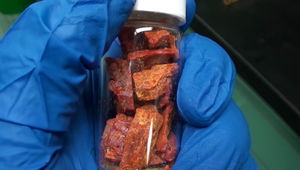Chloroplatinic acid
 |
This article is a stub. Please help Sciencemadness Wiki by expanding it, adding pictures, and improving existing text.
|
 Purified chloroplatinic acid
| |
| Names | |
|---|---|
| IUPAC name
Dihydrogen hexachloroplatinate(2–)
| |
| Other names
Chloroplatinic(IV) acid
Dihydrogen hexachloroplatinate Hexachloroplatinic acid Platinic chloride Speier's catalyst | |
| Properties | |
| H2PtCl6 | |
| Molar mass | 409.81 g/mol |
| Appearance | Reddish-brown solid, hygroscopic |
| Density | 2.431 g/cm3 |
| Melting point | 60 °C (140 °F; 333 K) (decomposes) |
| Boiling point | Decomposes |
| Very soluble | |
| Solubility | Soluble in acetone, diethyl ether, ethanol, ethyl acetate Insoluble in nitric acid |
| Hazards | |
| Safety data sheet | Sigma-Aldrich (hydrate) |
| Flash point | Non-flammable |
| Except where otherwise noted, data are given for materials in their standard state (at 25 °C [77 °F], 100 kPa). | |
| Infobox references | |
Chloroplatinic acid or hexachloroplatinic acid is an inorganic compound obtained by dissolving platinum metal in aqua regia. Although often written in shorthand as H2PtCl6, it is the hydronium (H3O+) salt of the hexachloroplatinate anion (PtCl2−
6). The compound is also available as the hexahydrate.
Contents
[hide]Properties
Chemical
Chloroplatinic acid breaks down to platinum(II) chloride when heated to high temperatures.
Physical
Hexachloroplatinic acid is a reddish-brown solid, very hygroscopic.
Availability
Hexachloroplatinic acid is sold by chemical suppliers, but it's expensive.
Preparation
Chloroplatinic acid can be made by dissolving platinum metal in aqua regia:
- Pt + 4 HNO3 + 6 HCl → H2PtCl6 + 4 NO2 + 4 H2O
Projects
- Platinum extraction
- Make platinum compounds
- Catalyst
- Determination of potassium
Handling
Safety
Chloroplatinic acid is harmful if ingested.
Storage
Chloroplatinic acid should be kept in closed bottles, in a closed locker.
Disposal
Should be reduced to elemental platinum and recycled.